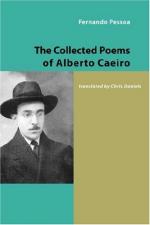|
This section contains 3,385 words (approx. 12 pages at 300 words per page) |

|
SOURCE: "Fernando Pessoa and the Cubist Perspective," in Hispania, Vol. 70, No. 1, March 1987, pp. 73-8.
In this excerpt, Guyer relates Pessoa's work and poetic priorities to those of the Cubist aesthetic movement
The nineteenth century in the mainstream of Western civilization was unquestionably one of those periods marked to a great degree by an enthusiastic dedication to a vision. The vision was one of order, of progress, and of the subjugation of nature to humanity's technical genius. This self-assured interpretation of one's ability to know and dominate the environment is reflected in that century's artistic interpretation of the world.
Followers of this Positivistic thought reacted with some conviction. Their reaction was a rejection of the pre-eminence of reason, order and measure. In its place, artists often allied themselves with reason's negative image. Some saw this anti-Positivistic reaction, this revaluation of the mysterious and the unknown, as an unwisely retrogressive...
|
This section contains 3,385 words (approx. 12 pages at 300 words per page) |

|


